BTEC HND in Hospitality Management: Business Toolkit Report - Unit 04
VerifiedAdded on 2022/07/06
|14
|5275
|24
Report
AI Summary
This report, submitted by a student for the BTEC HND in Hospitality Management, provides a comprehensive analysis of the hospitality industry using East London Catering as a case study. It begins by examining the management of finance and record transactions to reduce costs, including the application of financial principles and the use of general journals, T-accounts, and trial balances. The report then delves into the management of the human resources life cycle, focusing on recruitment, onboarding, career development, employee recognition, and offboarding, all within the context of an HR strategy. Furthermore, it explores the effects of legal and ethical considerations on the hospitality industry, discussing relevant legislation and its impact on business decisions. Finally, the report investigates the influence of coordinating and blending different functions of the departments within the hospitality sector, highlighting communication, coordination, and monitoring methods. The report concludes with a summary of the key findings and recommendations for the improvement of the hospitality business.
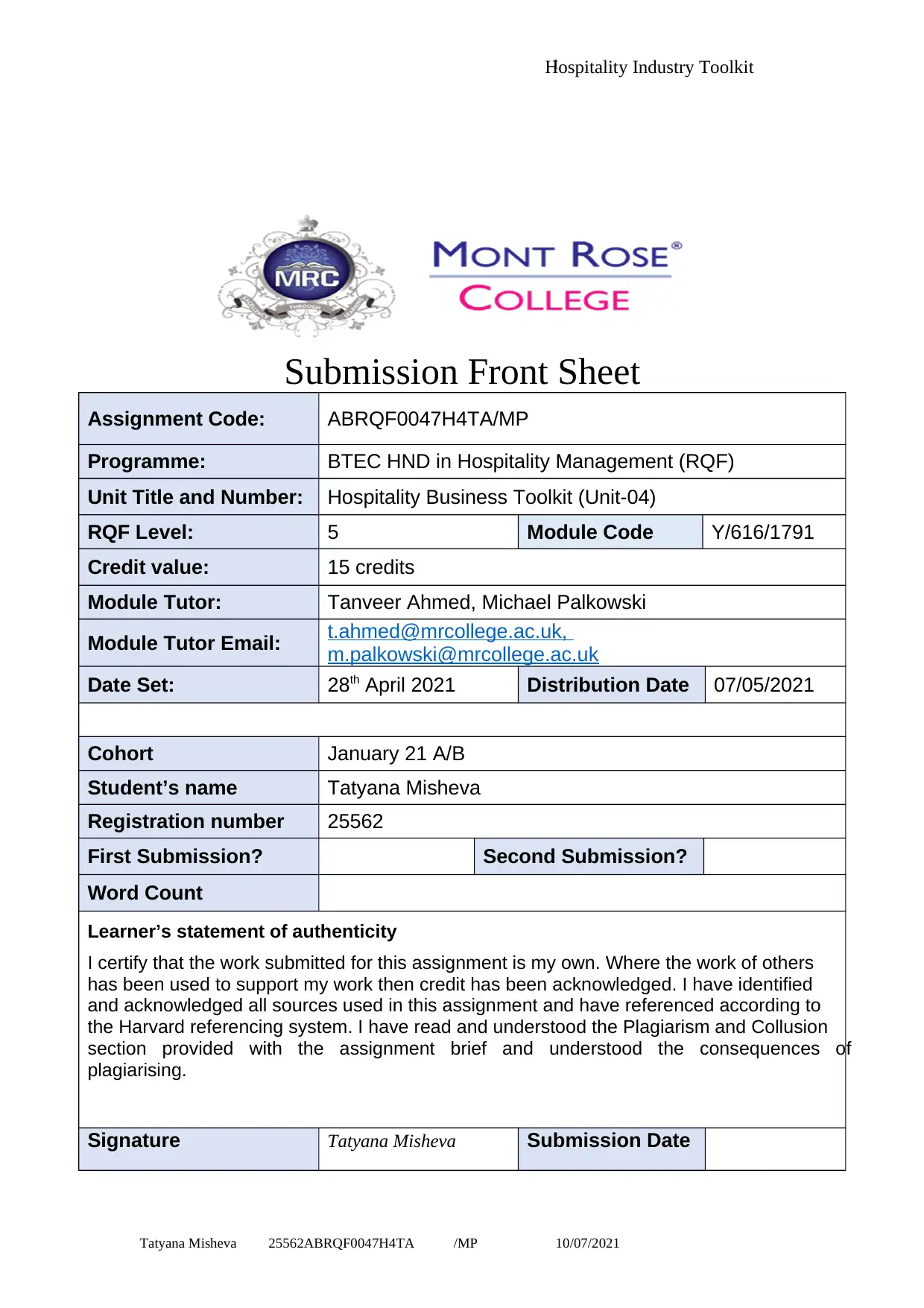
Hospitality Industry Toolkit
Submission Front Sheet
Assignment Code: ABRQF0047H4TA/MP
Programme: BTEC HND in Hospitality Management (RQF)
Unit Title and Number: Hospitality Business Toolkit (Unit-04)
RQF Level: 5 Module Code Y/616/1791
Credit value: 15 credits
Module Tutor: Tanveer Ahmed, Michael Palkowski
Module Tutor Email: t.ahmed@mrcollege.ac.uk,
m.palkowski@mrcollege.ac.uk
Date Set: 28th April 2021 Distribution Date 07/05/2021
Cohort January 21 A/B
Student’s name Tatyana Misheva
Registration number 25562
First Submission? Second Submission?
Word Count
Learner’s statement of authenticity
I certify that the work submitted for this assignment is my own. Where the work of others
has been used to support my work then credit has been acknowledged. I have identified
and acknowledged all sources used in this assignment and have referenced according to
the Harvard referencing system. I have read and understood the Plagiarism and Collusion
section provided with the assignment brief and understood the consequences of
plagiarising.
Signature Tatyana Misheva Submission Date
Tatyana Misheva 25562ABRQF0047H4TA /MP 10/07/2021
1
Submission Front Sheet
Assignment Code: ABRQF0047H4TA/MP
Programme: BTEC HND in Hospitality Management (RQF)
Unit Title and Number: Hospitality Business Toolkit (Unit-04)
RQF Level: 5 Module Code Y/616/1791
Credit value: 15 credits
Module Tutor: Tanveer Ahmed, Michael Palkowski
Module Tutor Email: t.ahmed@mrcollege.ac.uk,
m.palkowski@mrcollege.ac.uk
Date Set: 28th April 2021 Distribution Date 07/05/2021
Cohort January 21 A/B
Student’s name Tatyana Misheva
Registration number 25562
First Submission? Second Submission?
Word Count
Learner’s statement of authenticity
I certify that the work submitted for this assignment is my own. Where the work of others
has been used to support my work then credit has been acknowledged. I have identified
and acknowledged all sources used in this assignment and have referenced according to
the Harvard referencing system. I have read and understood the Plagiarism and Collusion
section provided with the assignment brief and understood the consequences of
plagiarising.
Signature Tatyana Misheva Submission Date
Tatyana Misheva 25562ABRQF0047H4TA /MP 10/07/2021
1
Secure Best Marks with AI Grader
Need help grading? Try our AI Grader for instant feedback on your assignments.
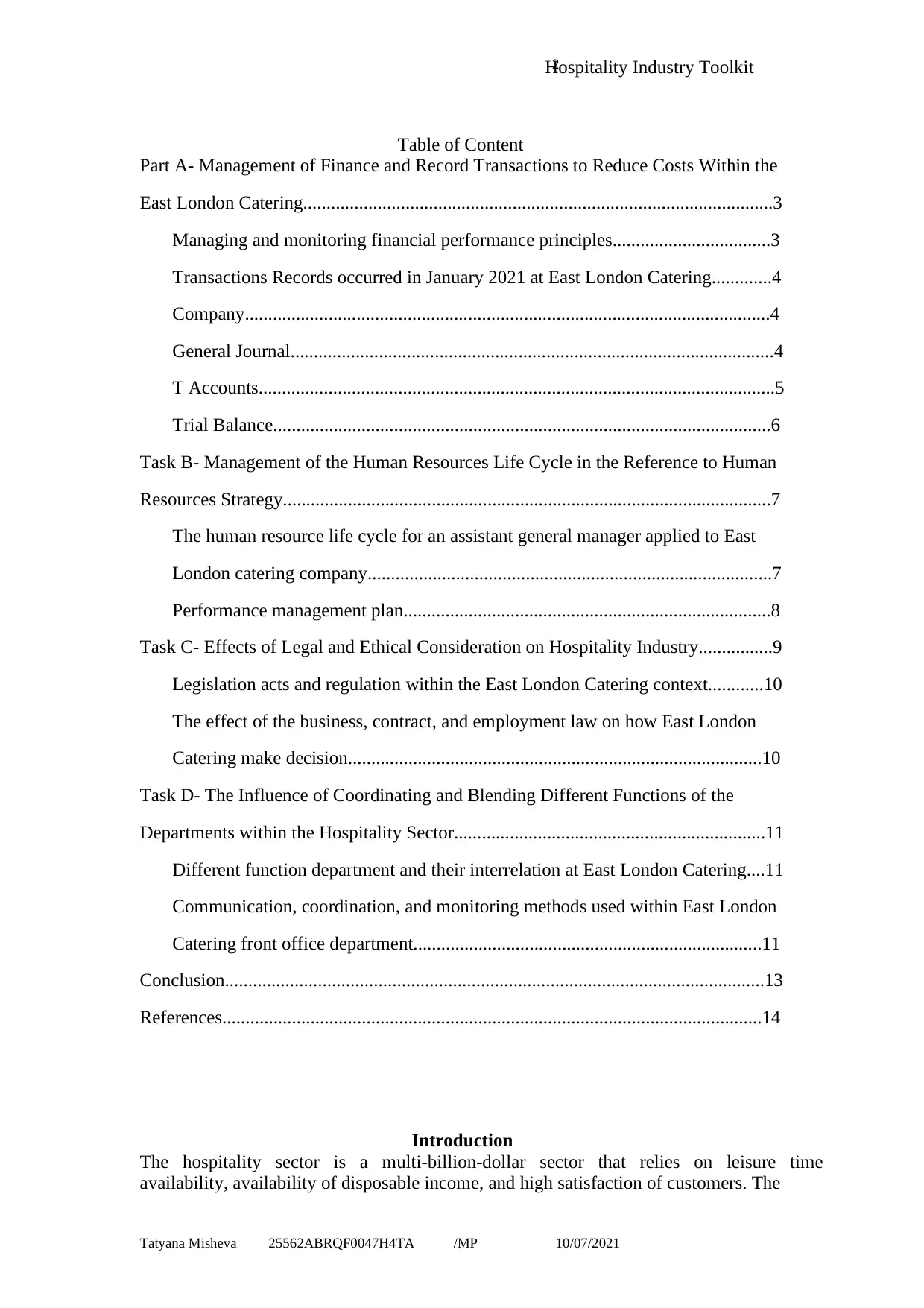
Hospitality Industry Toolkit
Table of Content
Part A- Management of Finance and Record Transactions to Reduce Costs Within the
East London Catering.....................................................................................................3
Managing and monitoring financial performance principles..................................3
Transactions Records occurred in January 2021 at East London Catering.............4
Company.................................................................................................................4
General Journal........................................................................................................4
T Accounts...............................................................................................................5
Trial Balance...........................................................................................................6
Task B- Management of the Human Resources Life Cycle in the Reference to Human
Resources Strategy.........................................................................................................7
The human resource life cycle for an assistant general manager applied to East
London catering company.......................................................................................7
Performance management plan...............................................................................8
Task C- Effects of Legal and Ethical Consideration on Hospitality Industry................9
Legislation acts and regulation within the East London Catering context............10
The effect of the business, contract, and employment law on how East London
Catering make decision.........................................................................................10
Task D- The Influence of Coordinating and Blending Different Functions of the
Departments within the Hospitality Sector...................................................................11
Different function department and their interrelation at East London Catering....11
Communication, coordination, and monitoring methods used within East London
Catering front office department...........................................................................11
Conclusion....................................................................................................................13
References....................................................................................................................14
Introduction
The hospitality sector is a multi-billion-dollar sector that relies on leisure time
availability, availability of disposable income, and high satisfaction of customers. The
Tatyana Misheva 25562ABRQF0047H4TA /MP 10/07/2021
2
Table of Content
Part A- Management of Finance and Record Transactions to Reduce Costs Within the
East London Catering.....................................................................................................3
Managing and monitoring financial performance principles..................................3
Transactions Records occurred in January 2021 at East London Catering.............4
Company.................................................................................................................4
General Journal........................................................................................................4
T Accounts...............................................................................................................5
Trial Balance...........................................................................................................6
Task B- Management of the Human Resources Life Cycle in the Reference to Human
Resources Strategy.........................................................................................................7
The human resource life cycle for an assistant general manager applied to East
London catering company.......................................................................................7
Performance management plan...............................................................................8
Task C- Effects of Legal and Ethical Consideration on Hospitality Industry................9
Legislation acts and regulation within the East London Catering context............10
The effect of the business, contract, and employment law on how East London
Catering make decision.........................................................................................10
Task D- The Influence of Coordinating and Blending Different Functions of the
Departments within the Hospitality Sector...................................................................11
Different function department and their interrelation at East London Catering....11
Communication, coordination, and monitoring methods used within East London
Catering front office department...........................................................................11
Conclusion....................................................................................................................13
References....................................................................................................................14
Introduction
The hospitality sector is a multi-billion-dollar sector that relies on leisure time
availability, availability of disposable income, and high satisfaction of customers. The
Tatyana Misheva 25562ABRQF0047H4TA /MP 10/07/2021
2
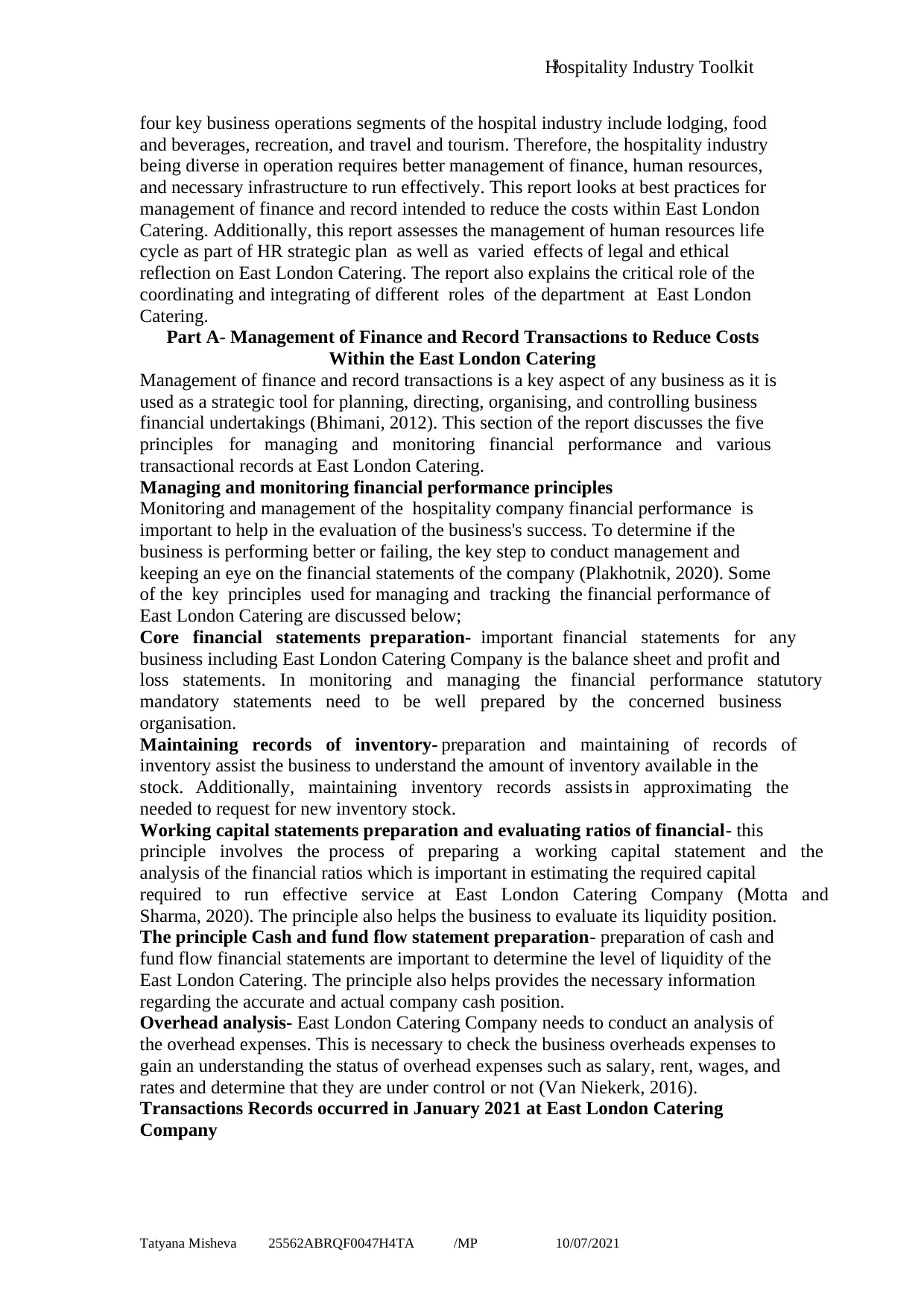
Hospitality Industry Toolkit
four key business operations segments of the hospital industry include lodging, food
and beverages, recreation, and travel and tourism. Therefore, the hospitality industry
being diverse in operation requires better management of finance, human resources,
and necessary infrastructure to run effectively. This report looks at best practices for
management of finance and record intended to reduce the costs within East London
Catering. Additionally, this report assesses the management of human resources life
cycle as part of HR strategic plan as well as varied effects of legal and ethical
reflection on East London Catering. The report also explains the critical role of the
coordinating and integrating of different roles of the department at East London
Catering.
Part A- Management of Finance and Record Transactions to Reduce Costs
Within the East London Catering
Management of finance and record transactions is a key aspect of any business as it is
used as a strategic tool for planning, directing, organising, and controlling business
financial undertakings (Bhimani, 2012). This section of the report discusses the five
principles for managing and monitoring financial performance and various
transactional records at East London Catering.
Managing and monitoring financial performance principles
Monitoring and management of the hospitality company financial performance is
important to help in the evaluation of the business's success. To determine if the
business is performing better or failing, the key step to conduct management and
keeping an eye on the financial statements of the company (Plakhotnik, 2020). Some
of the key principles used for managing and tracking the financial performance of
East London Catering are discussed below;
Core financial statements preparation- important financial statements for any
business including East London Catering Company is the balance sheet and profit and
loss statements. In monitoring and managing the financial performance statutory
mandatory statements need to be well prepared by the concerned business
organisation.
Maintaining records of inventory- preparation and maintaining of records of
inventory assist the business to understand the amount of inventory available in the
stock. Additionally, maintaining inventory records assists in approximating the
needed to request for new inventory stock.
Working capital statements preparation and evaluating ratios of financial- this
principle involves the process of preparing a working capital statement and the
analysis of the financial ratios which is important in estimating the required capital
required to run effective service at East London Catering Company (Motta and
Sharma, 2020). The principle also helps the business to evaluate its liquidity position.
The principle Cash and fund flow statement preparation- preparation of cash and
fund flow financial statements are important to determine the level of liquidity of the
East London Catering. The principle also helps provides the necessary information
regarding the accurate and actual company cash position.
Overhead analysis- East London Catering Company needs to conduct an analysis of
the overhead expenses. This is necessary to check the business overheads expenses to
gain an understanding the status of overhead expenses such as salary, rent, wages, and
rates and determine that they are under control or not (Van Niekerk, 2016).
Transactions Records occurred in January 2021 at East London Catering
Company
Tatyana Misheva 25562ABRQF0047H4TA /MP 10/07/2021
3
four key business operations segments of the hospital industry include lodging, food
and beverages, recreation, and travel and tourism. Therefore, the hospitality industry
being diverse in operation requires better management of finance, human resources,
and necessary infrastructure to run effectively. This report looks at best practices for
management of finance and record intended to reduce the costs within East London
Catering. Additionally, this report assesses the management of human resources life
cycle as part of HR strategic plan as well as varied effects of legal and ethical
reflection on East London Catering. The report also explains the critical role of the
coordinating and integrating of different roles of the department at East London
Catering.
Part A- Management of Finance and Record Transactions to Reduce Costs
Within the East London Catering
Management of finance and record transactions is a key aspect of any business as it is
used as a strategic tool for planning, directing, organising, and controlling business
financial undertakings (Bhimani, 2012). This section of the report discusses the five
principles for managing and monitoring financial performance and various
transactional records at East London Catering.
Managing and monitoring financial performance principles
Monitoring and management of the hospitality company financial performance is
important to help in the evaluation of the business's success. To determine if the
business is performing better or failing, the key step to conduct management and
keeping an eye on the financial statements of the company (Plakhotnik, 2020). Some
of the key principles used for managing and tracking the financial performance of
East London Catering are discussed below;
Core financial statements preparation- important financial statements for any
business including East London Catering Company is the balance sheet and profit and
loss statements. In monitoring and managing the financial performance statutory
mandatory statements need to be well prepared by the concerned business
organisation.
Maintaining records of inventory- preparation and maintaining of records of
inventory assist the business to understand the amount of inventory available in the
stock. Additionally, maintaining inventory records assists in approximating the
needed to request for new inventory stock.
Working capital statements preparation and evaluating ratios of financial- this
principle involves the process of preparing a working capital statement and the
analysis of the financial ratios which is important in estimating the required capital
required to run effective service at East London Catering Company (Motta and
Sharma, 2020). The principle also helps the business to evaluate its liquidity position.
The principle Cash and fund flow statement preparation- preparation of cash and
fund flow financial statements are important to determine the level of liquidity of the
East London Catering. The principle also helps provides the necessary information
regarding the accurate and actual company cash position.
Overhead analysis- East London Catering Company needs to conduct an analysis of
the overhead expenses. This is necessary to check the business overheads expenses to
gain an understanding the status of overhead expenses such as salary, rent, wages, and
rates and determine that they are under control or not (Van Niekerk, 2016).
Transactions Records occurred in January 2021 at East London Catering
Company
Tatyana Misheva 25562ABRQF0047H4TA /MP 10/07/2021
3
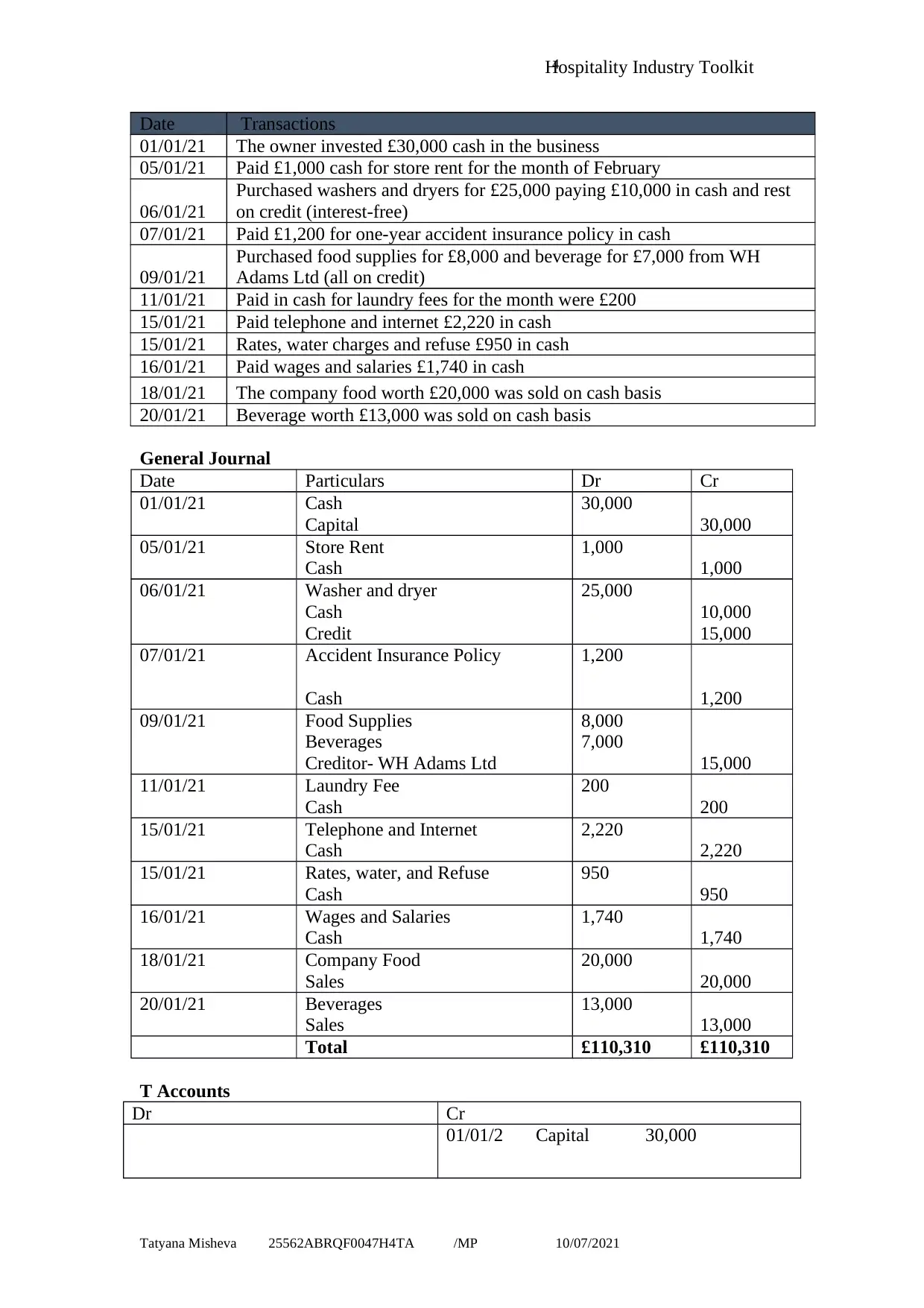
Hospitality Industry Toolkit
Date Transactions
01/01/21 The owner invested £30,000 cash in the business
05/01/21 Paid £1,000 cash for store rent for the month of February
06/01/21
Purchased washers and dryers for £25,000 paying £10,000 in cash and rest
on credit (interest-free)
07/01/21 Paid £1,200 for one-year accident insurance policy in cash
09/01/21
Purchased food supplies for £8,000 and beverage for £7,000 from WH
Adams Ltd (all on credit)
11/01/21 Paid in cash for laundry fees for the month were £200
15/01/21 Paid telephone and internet £2,220 in cash
15/01/21 Rates, water charges and refuse £950 in cash
16/01/21 Paid wages and salaries £1,740 in cash
18/01/21 The company food worth £20,000 was sold on cash basis
20/01/21 Beverage worth £13,000 was sold on cash basis
General Journal
Date Particulars Dr Cr
01/01/21 Cash
Capital
30,000
30,000
05/01/21 Store Rent
Cash
1,000
1,000
06/01/21 Washer and dryer
Cash
Credit
25,000
10,000
15,000
07/01/21 Accident Insurance Policy
Cash
1,200
1,200
09/01/21 Food Supplies
Beverages
Creditor- WH Adams Ltd
8,000
7,000
15,000
11/01/21 Laundry Fee
Cash
200
200
15/01/21 Telephone and Internet
Cash
2,220
2,220
15/01/21 Rates, water, and Refuse
Cash
950
950
16/01/21 Wages and Salaries
Cash
1,740
1,740
18/01/21 Company Food
Sales
20,000
20,000
20/01/21 Beverages
Sales
13,000
13,000
Total £110,310 £110,310
T Accounts
Dr Cr
01/01/2 Capital 30,000
Tatyana Misheva 25562ABRQF0047H4TA /MP 10/07/2021
4
Date Transactions
01/01/21 The owner invested £30,000 cash in the business
05/01/21 Paid £1,000 cash for store rent for the month of February
06/01/21
Purchased washers and dryers for £25,000 paying £10,000 in cash and rest
on credit (interest-free)
07/01/21 Paid £1,200 for one-year accident insurance policy in cash
09/01/21
Purchased food supplies for £8,000 and beverage for £7,000 from WH
Adams Ltd (all on credit)
11/01/21 Paid in cash for laundry fees for the month were £200
15/01/21 Paid telephone and internet £2,220 in cash
15/01/21 Rates, water charges and refuse £950 in cash
16/01/21 Paid wages and salaries £1,740 in cash
18/01/21 The company food worth £20,000 was sold on cash basis
20/01/21 Beverage worth £13,000 was sold on cash basis
General Journal
Date Particulars Dr Cr
01/01/21 Cash
Capital
30,000
30,000
05/01/21 Store Rent
Cash
1,000
1,000
06/01/21 Washer and dryer
Cash
Credit
25,000
10,000
15,000
07/01/21 Accident Insurance Policy
Cash
1,200
1,200
09/01/21 Food Supplies
Beverages
Creditor- WH Adams Ltd
8,000
7,000
15,000
11/01/21 Laundry Fee
Cash
200
200
15/01/21 Telephone and Internet
Cash
2,220
2,220
15/01/21 Rates, water, and Refuse
Cash
950
950
16/01/21 Wages and Salaries
Cash
1,740
1,740
18/01/21 Company Food
Sales
20,000
20,000
20/01/21 Beverages
Sales
13,000
13,000
Total £110,310 £110,310
T Accounts
Dr Cr
01/01/2 Capital 30,000
Tatyana Misheva 25562ABRQF0047H4TA /MP 10/07/2021
4
Secure Best Marks with AI Grader
Need help grading? Try our AI Grader for instant feedback on your assignments.
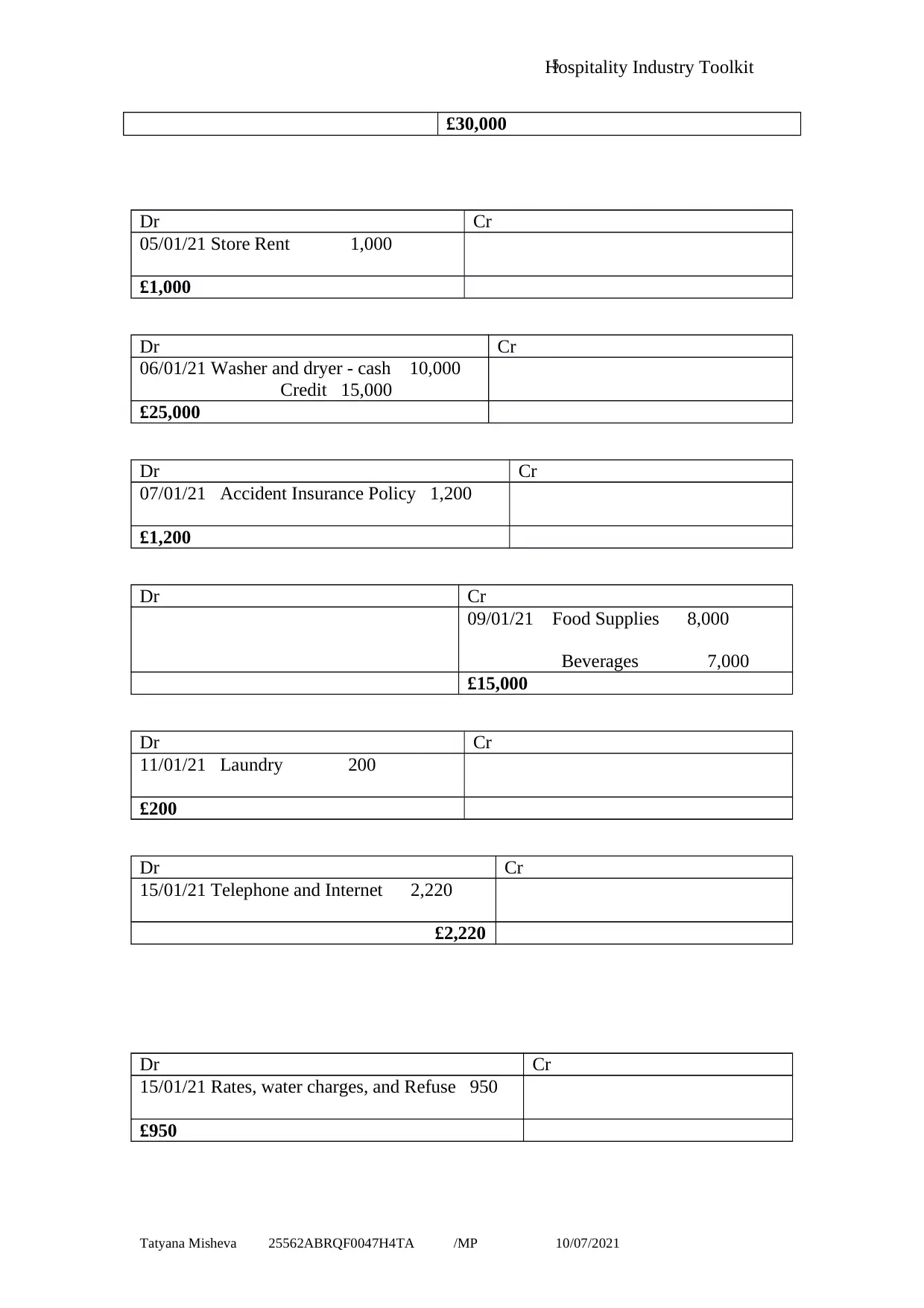
Hospitality Industry Toolkit
£30,000
Dr Cr
05/01/21 Store Rent 1,000
£1,000
Dr Cr
06/01/21 Washer and dryer - cash 10,000
Credit 15,000
£25,000
Dr Cr
07/01/21 Accident Insurance Policy 1,200
£1,200
Dr Cr
09/01/21 Food Supplies 8,000
Beverages 7,000
£15,000
Dr Cr
11/01/21 Laundry 200
£200
Dr Cr
15/01/21 Telephone and Internet 2,220
£2,220
Dr Cr
15/01/21 Rates, water charges, and Refuse 950
£950
Tatyana Misheva 25562ABRQF0047H4TA /MP 10/07/2021
5
£30,000
Dr Cr
05/01/21 Store Rent 1,000
£1,000
Dr Cr
06/01/21 Washer and dryer - cash 10,000
Credit 15,000
£25,000
Dr Cr
07/01/21 Accident Insurance Policy 1,200
£1,200
Dr Cr
09/01/21 Food Supplies 8,000
Beverages 7,000
£15,000
Dr Cr
11/01/21 Laundry 200
£200
Dr Cr
15/01/21 Telephone and Internet 2,220
£2,220
Dr Cr
15/01/21 Rates, water charges, and Refuse 950
£950
Tatyana Misheva 25562ABRQF0047H4TA /MP 10/07/2021
5
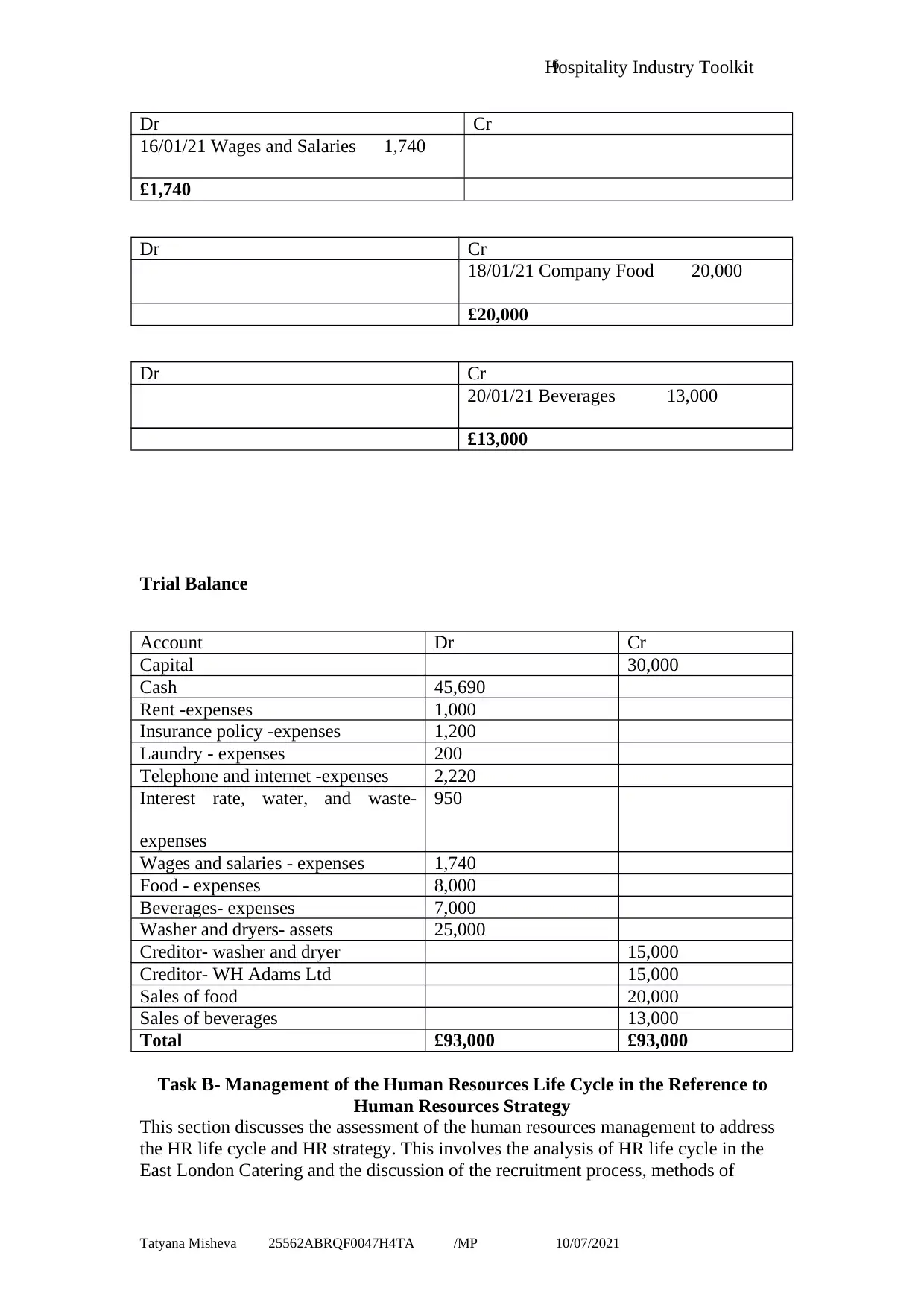
Hospitality Industry Toolkit
Dr Cr
16/01/21 Wages and Salaries 1,740
£1,740
Dr Cr
18/01/21 Company Food 20,000
£20,000
Dr Cr
20/01/21 Beverages 13,000
£13,000
Trial Balance
Account Dr Cr
Capital 30,000
Cash 45,690
Rent -expenses 1,000
Insurance policy -expenses 1,200
Laundry - expenses 200
Telephone and internet -expenses 2,220
Interest rate, water, and waste-
expenses
950
Wages and salaries - expenses 1,740
Food - expenses 8,000
Beverages- expenses 7,000
Washer and dryers- assets 25,000
Creditor- washer and dryer 15,000
Creditor- WH Adams Ltd 15,000
Sales of food 20,000
Sales of beverages 13,000
Total £93,000 £93,000
Task B- Management of the Human Resources Life Cycle in the Reference to
Human Resources Strategy
This section discusses the assessment of the human resources management to address
the HR life cycle and HR strategy. This involves the analysis of HR life cycle in the
East London Catering and the discussion of the recruitment process, methods of
Tatyana Misheva 25562ABRQF0047H4TA /MP 10/07/2021
6
Dr Cr
16/01/21 Wages and Salaries 1,740
£1,740
Dr Cr
18/01/21 Company Food 20,000
£20,000
Dr Cr
20/01/21 Beverages 13,000
£13,000
Trial Balance
Account Dr Cr
Capital 30,000
Cash 45,690
Rent -expenses 1,000
Insurance policy -expenses 1,200
Laundry - expenses 200
Telephone and internet -expenses 2,220
Interest rate, water, and waste-
expenses
950
Wages and salaries - expenses 1,740
Food - expenses 8,000
Beverages- expenses 7,000
Washer and dryers- assets 25,000
Creditor- washer and dryer 15,000
Creditor- WH Adams Ltd 15,000
Sales of food 20,000
Sales of beverages 13,000
Total £93,000 £93,000
Task B- Management of the Human Resources Life Cycle in the Reference to
Human Resources Strategy
This section discusses the assessment of the human resources management to address
the HR life cycle and HR strategy. This involves the analysis of HR life cycle in the
East London Catering and the discussion of the recruitment process, methods of
Tatyana Misheva 25562ABRQF0047H4TA /MP 10/07/2021
6
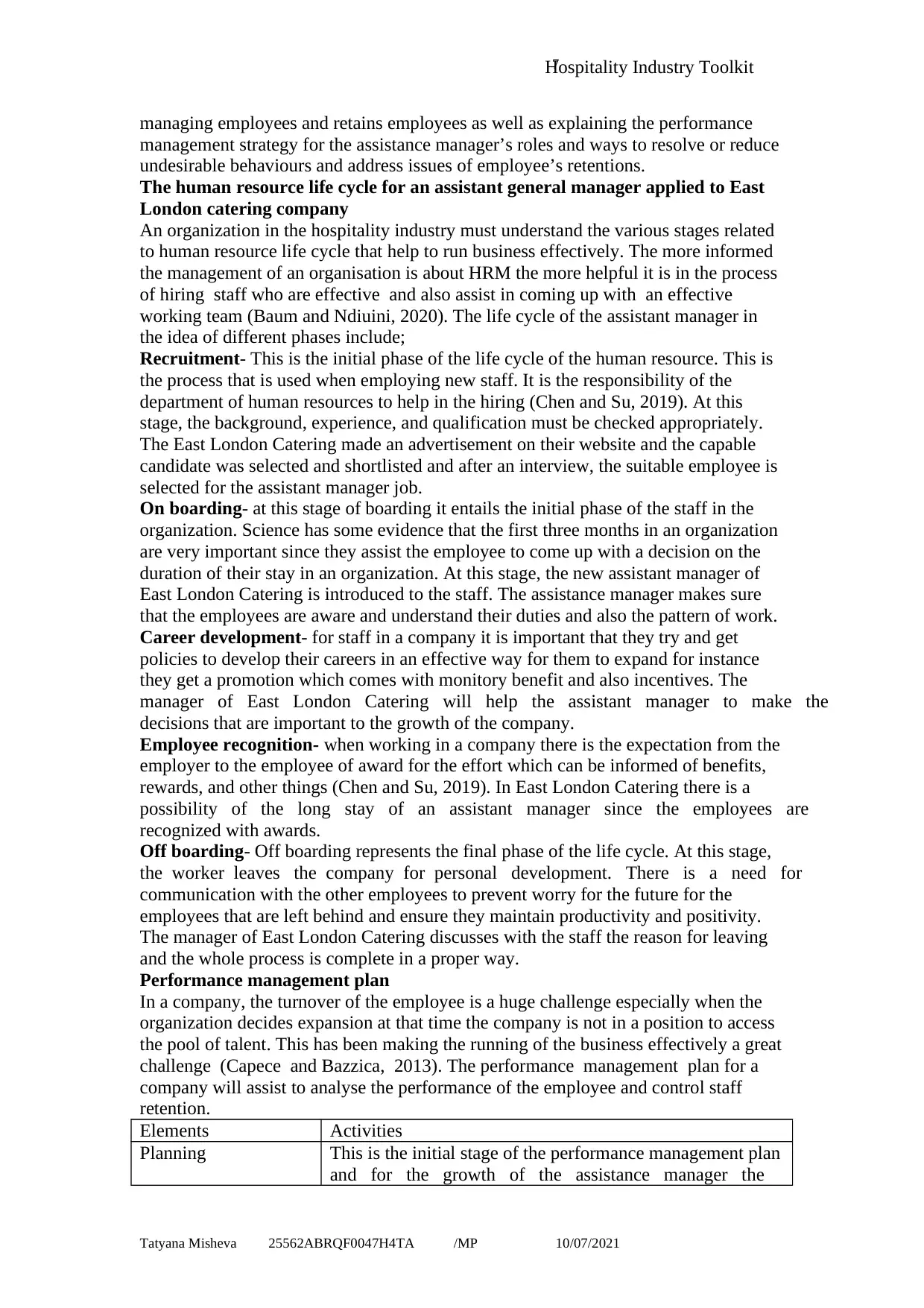
Hospitality Industry Toolkit
managing employees and retains employees as well as explaining the performance
management strategy for the assistance manager’s roles and ways to resolve or reduce
undesirable behaviours and address issues of employee’s retentions.
The human resource life cycle for an assistant general manager applied to East
London catering company
An organization in the hospitality industry must understand the various stages related
to human resource life cycle that help to run business effectively. The more informed
the management of an organisation is about HRM the more helpful it is in the process
of hiring staff who are effective and also assist in coming up with an effective
working team (Baum and Ndiuini, 2020). The life cycle of the assistant manager in
the idea of different phases include;
Recruitment- This is the initial phase of the life cycle of the human resource. This is
the process that is used when employing new staff. It is the responsibility of the
department of human resources to help in the hiring (Chen and Su, 2019). At this
stage, the background, experience, and qualification must be checked appropriately.
The East London Catering made an advertisement on their website and the capable
candidate was selected and shortlisted and after an interview, the suitable employee is
selected for the assistant manager job.
On boarding- at this stage of boarding it entails the initial phase of the staff in the
organization. Science has some evidence that the first three months in an organization
are very important since they assist the employee to come up with a decision on the
duration of their stay in an organization. At this stage, the new assistant manager of
East London Catering is introduced to the staff. The assistance manager makes sure
that the employees are aware and understand their duties and also the pattern of work.
Career development- for staff in a company it is important that they try and get
policies to develop their careers in an effective way for them to expand for instance
they get a promotion which comes with monitory benefit and also incentives. The
manager of East London Catering will help the assistant manager to make the
decisions that are important to the growth of the company.
Employee recognition- when working in a company there is the expectation from the
employer to the employee of award for the effort which can be informed of benefits,
rewards, and other things (Chen and Su, 2019). In East London Catering there is a
possibility of the long stay of an assistant manager since the employees are
recognized with awards.
Off boarding- Off boarding represents the final phase of the life cycle. At this stage,
the worker leaves the company for personal development. There is a need for
communication with the other employees to prevent worry for the future for the
employees that are left behind and ensure they maintain productivity and positivity.
The manager of East London Catering discusses with the staff the reason for leaving
and the whole process is complete in a proper way.
Performance management plan
In a company, the turnover of the employee is a huge challenge especially when the
organization decides expansion at that time the company is not in a position to access
the pool of talent. This has been making the running of the business effectively a great
challenge (Capece and Bazzica, 2013). The performance management plan for a
company will assist to analyse the performance of the employee and control staff
retention.
Elements Activities
Planning This is the initial stage of the performance management plan
and for the growth of the assistance manager the
Tatyana Misheva 25562ABRQF0047H4TA /MP 10/07/2021
7
managing employees and retains employees as well as explaining the performance
management strategy for the assistance manager’s roles and ways to resolve or reduce
undesirable behaviours and address issues of employee’s retentions.
The human resource life cycle for an assistant general manager applied to East
London catering company
An organization in the hospitality industry must understand the various stages related
to human resource life cycle that help to run business effectively. The more informed
the management of an organisation is about HRM the more helpful it is in the process
of hiring staff who are effective and also assist in coming up with an effective
working team (Baum and Ndiuini, 2020). The life cycle of the assistant manager in
the idea of different phases include;
Recruitment- This is the initial phase of the life cycle of the human resource. This is
the process that is used when employing new staff. It is the responsibility of the
department of human resources to help in the hiring (Chen and Su, 2019). At this
stage, the background, experience, and qualification must be checked appropriately.
The East London Catering made an advertisement on their website and the capable
candidate was selected and shortlisted and after an interview, the suitable employee is
selected for the assistant manager job.
On boarding- at this stage of boarding it entails the initial phase of the staff in the
organization. Science has some evidence that the first three months in an organization
are very important since they assist the employee to come up with a decision on the
duration of their stay in an organization. At this stage, the new assistant manager of
East London Catering is introduced to the staff. The assistance manager makes sure
that the employees are aware and understand their duties and also the pattern of work.
Career development- for staff in a company it is important that they try and get
policies to develop their careers in an effective way for them to expand for instance
they get a promotion which comes with monitory benefit and also incentives. The
manager of East London Catering will help the assistant manager to make the
decisions that are important to the growth of the company.
Employee recognition- when working in a company there is the expectation from the
employer to the employee of award for the effort which can be informed of benefits,
rewards, and other things (Chen and Su, 2019). In East London Catering there is a
possibility of the long stay of an assistant manager since the employees are
recognized with awards.
Off boarding- Off boarding represents the final phase of the life cycle. At this stage,
the worker leaves the company for personal development. There is a need for
communication with the other employees to prevent worry for the future for the
employees that are left behind and ensure they maintain productivity and positivity.
The manager of East London Catering discusses with the staff the reason for leaving
and the whole process is complete in a proper way.
Performance management plan
In a company, the turnover of the employee is a huge challenge especially when the
organization decides expansion at that time the company is not in a position to access
the pool of talent. This has been making the running of the business effectively a great
challenge (Capece and Bazzica, 2013). The performance management plan for a
company will assist to analyse the performance of the employee and control staff
retention.
Elements Activities
Planning This is the initial stage of the performance management plan
and for the growth of the assistance manager the
Tatyana Misheva 25562ABRQF0047H4TA /MP 10/07/2021
7
Paraphrase This Document
Need a fresh take? Get an instant paraphrase of this document with our AI Paraphraser
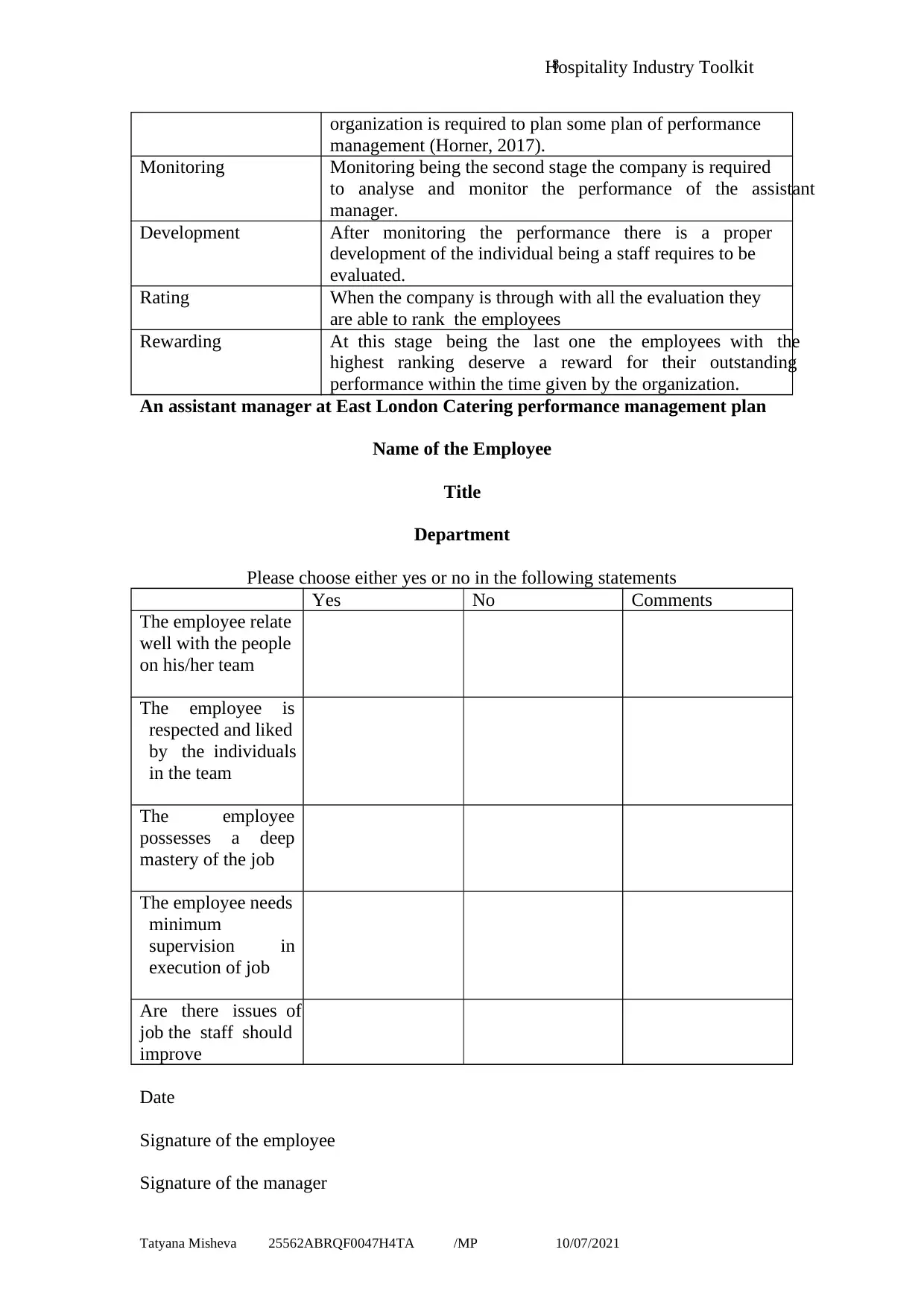
Hospitality Industry Toolkit
organization is required to plan some plan of performance
management (Horner, 2017).
Monitoring Monitoring being the second stage the company is required
to analyse and monitor the performance of the assistant
manager.
Development After monitoring the performance there is a proper
development of the individual being a staff requires to be
evaluated.
Rating When the company is through with all the evaluation they
are able to rank the employees
Rewarding At this stage being the last one the employees with the
highest ranking deserve a reward for their outstanding
performance within the time given by the organization.
An assistant manager at East London Catering performance management plan
Name of the Employee
Title
Department
Please choose either yes or no in the following statements
Yes No Comments
The employee relate
well with the people
on his/her team
The employee is
respected and liked
by the individuals
in the team
The employee
possesses a deep
mastery of the job
The employee needs
minimum
supervision in
execution of job
Are there issues of
job the staff should
improve
Date
Signature of the employee
Signature of the manager
Tatyana Misheva 25562ABRQF0047H4TA /MP 10/07/2021
8
organization is required to plan some plan of performance
management (Horner, 2017).
Monitoring Monitoring being the second stage the company is required
to analyse and monitor the performance of the assistant
manager.
Development After monitoring the performance there is a proper
development of the individual being a staff requires to be
evaluated.
Rating When the company is through with all the evaluation they
are able to rank the employees
Rewarding At this stage being the last one the employees with the
highest ranking deserve a reward for their outstanding
performance within the time given by the organization.
An assistant manager at East London Catering performance management plan
Name of the Employee
Title
Department
Please choose either yes or no in the following statements
Yes No Comments
The employee relate
well with the people
on his/her team
The employee is
respected and liked
by the individuals
in the team
The employee
possesses a deep
mastery of the job
The employee needs
minimum
supervision in
execution of job
Are there issues of
job the staff should
improve
Date
Signature of the employee
Signature of the manager
Tatyana Misheva 25562ABRQF0047H4TA /MP 10/07/2021
8
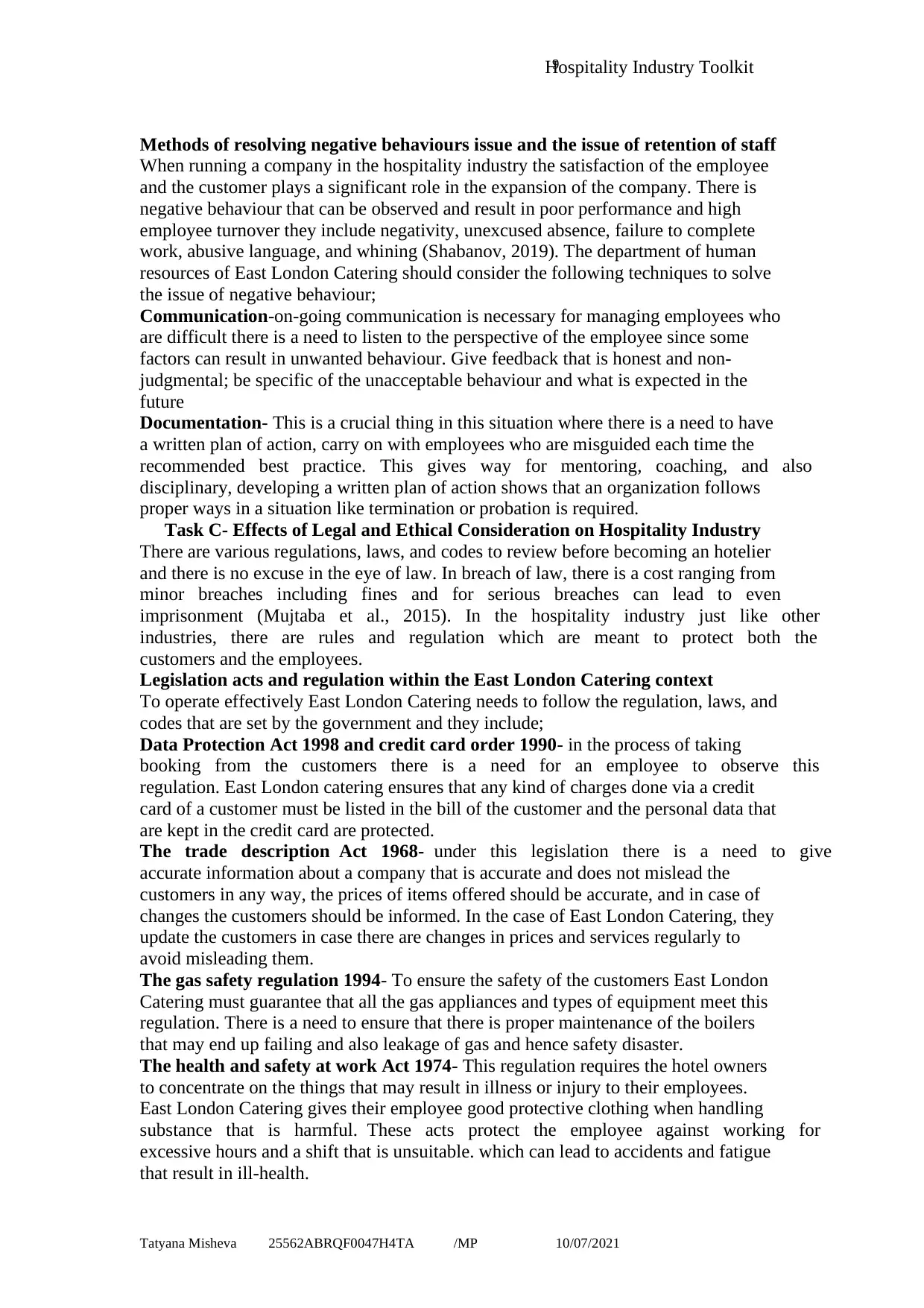
Hospitality Industry Toolkit
Methods of resolving negative behaviours issue and the issue of retention of staff
When running a company in the hospitality industry the satisfaction of the employee
and the customer plays a significant role in the expansion of the company. There is
negative behaviour that can be observed and result in poor performance and high
employee turnover they include negativity, unexcused absence, failure to complete
work, abusive language, and whining (Shabanov, 2019). The department of human
resources of East London Catering should consider the following techniques to solve
the issue of negative behaviour;
Communication-on-going communication is necessary for managing employees who
are difficult there is a need to listen to the perspective of the employee since some
factors can result in unwanted behaviour. Give feedback that is honest and non-
judgmental; be specific of the unacceptable behaviour and what is expected in the
future
Documentation- This is a crucial thing in this situation where there is a need to have
a written plan of action, carry on with employees who are misguided each time the
recommended best practice. This gives way for mentoring, coaching, and also
disciplinary, developing a written plan of action shows that an organization follows
proper ways in a situation like termination or probation is required.
Task C- Effects of Legal and Ethical Consideration on Hospitality Industry
There are various regulations, laws, and codes to review before becoming an hotelier
and there is no excuse in the eye of law. In breach of law, there is a cost ranging from
minor breaches including fines and for serious breaches can lead to even
imprisonment (Mujtaba et al., 2015). In the hospitality industry just like other
industries, there are rules and regulation which are meant to protect both the
customers and the employees.
Legislation acts and regulation within the East London Catering context
To operate effectively East London Catering needs to follow the regulation, laws, and
codes that are set by the government and they include;
Data Protection Act 1998 and credit card order 1990- in the process of taking
booking from the customers there is a need for an employee to observe this
regulation. East London catering ensures that any kind of charges done via a credit
card of a customer must be listed in the bill of the customer and the personal data that
are kept in the credit card are protected.
The trade description Act 1968- under this legislation there is a need to give
accurate information about a company that is accurate and does not mislead the
customers in any way, the prices of items offered should be accurate, and in case of
changes the customers should be informed. In the case of East London Catering, they
update the customers in case there are changes in prices and services regularly to
avoid misleading them.
The gas safety regulation 1994- To ensure the safety of the customers East London
Catering must guarantee that all the gas appliances and types of equipment meet this
regulation. There is a need to ensure that there is proper maintenance of the boilers
that may end up failing and also leakage of gas and hence safety disaster.
The health and safety at work Act 1974- This regulation requires the hotel owners
to concentrate on the things that may result in illness or injury to their employees.
East London Catering gives their employee good protective clothing when handling
substance that is harmful. These acts protect the employee against working for
excessive hours and a shift that is unsuitable. which can lead to accidents and fatigue
that result in ill-health.
Tatyana Misheva 25562ABRQF0047H4TA /MP 10/07/2021
9
Methods of resolving negative behaviours issue and the issue of retention of staff
When running a company in the hospitality industry the satisfaction of the employee
and the customer plays a significant role in the expansion of the company. There is
negative behaviour that can be observed and result in poor performance and high
employee turnover they include negativity, unexcused absence, failure to complete
work, abusive language, and whining (Shabanov, 2019). The department of human
resources of East London Catering should consider the following techniques to solve
the issue of negative behaviour;
Communication-on-going communication is necessary for managing employees who
are difficult there is a need to listen to the perspective of the employee since some
factors can result in unwanted behaviour. Give feedback that is honest and non-
judgmental; be specific of the unacceptable behaviour and what is expected in the
future
Documentation- This is a crucial thing in this situation where there is a need to have
a written plan of action, carry on with employees who are misguided each time the
recommended best practice. This gives way for mentoring, coaching, and also
disciplinary, developing a written plan of action shows that an organization follows
proper ways in a situation like termination or probation is required.
Task C- Effects of Legal and Ethical Consideration on Hospitality Industry
There are various regulations, laws, and codes to review before becoming an hotelier
and there is no excuse in the eye of law. In breach of law, there is a cost ranging from
minor breaches including fines and for serious breaches can lead to even
imprisonment (Mujtaba et al., 2015). In the hospitality industry just like other
industries, there are rules and regulation which are meant to protect both the
customers and the employees.
Legislation acts and regulation within the East London Catering context
To operate effectively East London Catering needs to follow the regulation, laws, and
codes that are set by the government and they include;
Data Protection Act 1998 and credit card order 1990- in the process of taking
booking from the customers there is a need for an employee to observe this
regulation. East London catering ensures that any kind of charges done via a credit
card of a customer must be listed in the bill of the customer and the personal data that
are kept in the credit card are protected.
The trade description Act 1968- under this legislation there is a need to give
accurate information about a company that is accurate and does not mislead the
customers in any way, the prices of items offered should be accurate, and in case of
changes the customers should be informed. In the case of East London Catering, they
update the customers in case there are changes in prices and services regularly to
avoid misleading them.
The gas safety regulation 1994- To ensure the safety of the customers East London
Catering must guarantee that all the gas appliances and types of equipment meet this
regulation. There is a need to ensure that there is proper maintenance of the boilers
that may end up failing and also leakage of gas and hence safety disaster.
The health and safety at work Act 1974- This regulation requires the hotel owners
to concentrate on the things that may result in illness or injury to their employees.
East London Catering gives their employee good protective clothing when handling
substance that is harmful. These acts protect the employee against working for
excessive hours and a shift that is unsuitable. which can lead to accidents and fatigue
that result in ill-health.
Tatyana Misheva 25562ABRQF0047H4TA /MP 10/07/2021
9
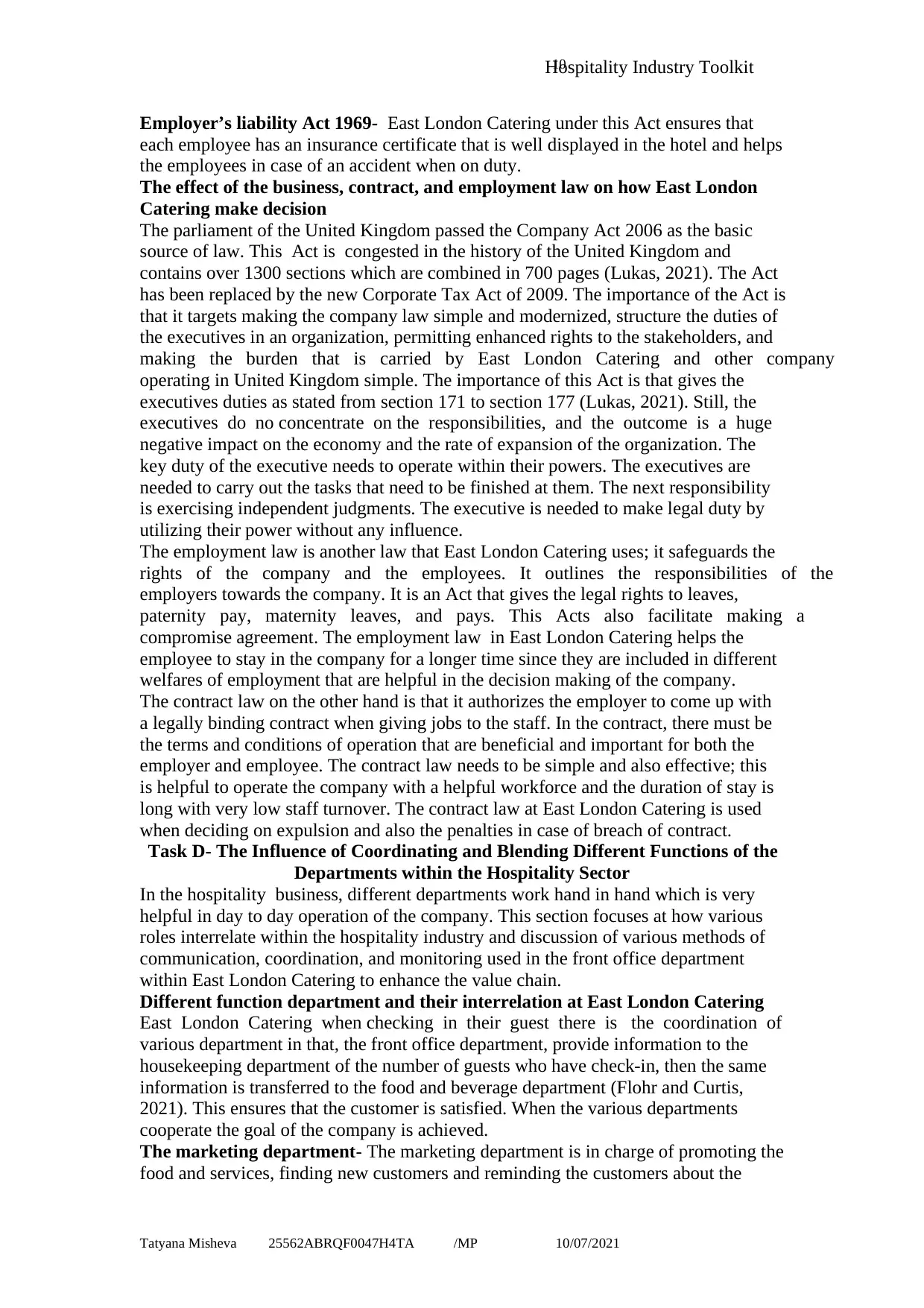
Hospitality Industry Toolkit
Employer’s liability Act 1969- East London Catering under this Act ensures that
each employee has an insurance certificate that is well displayed in the hotel and helps
the employees in case of an accident when on duty.
The effect of the business, contract, and employment law on how East London
Catering make decision
The parliament of the United Kingdom passed the Company Act 2006 as the basic
source of law. This Act is congested in the history of the United Kingdom and
contains over 1300 sections which are combined in 700 pages (Lukas, 2021). The Act
has been replaced by the new Corporate Tax Act of 2009. The importance of the Act is
that it targets making the company law simple and modernized, structure the duties of
the executives in an organization, permitting enhanced rights to the stakeholders, and
making the burden that is carried by East London Catering and other company
operating in United Kingdom simple. The importance of this Act is that gives the
executives duties as stated from section 171 to section 177 (Lukas, 2021). Still, the
executives do no concentrate on the responsibilities, and the outcome is a huge
negative impact on the economy and the rate of expansion of the organization. The
key duty of the executive needs to operate within their powers. The executives are
needed to carry out the tasks that need to be finished at them. The next responsibility
is exercising independent judgments. The executive is needed to make legal duty by
utilizing their power without any influence.
The employment law is another law that East London Catering uses; it safeguards the
rights of the company and the employees. It outlines the responsibilities of the
employers towards the company. It is an Act that gives the legal rights to leaves,
paternity pay, maternity leaves, and pays. This Acts also facilitate making a
compromise agreement. The employment law in East London Catering helps the
employee to stay in the company for a longer time since they are included in different
welfares of employment that are helpful in the decision making of the company.
The contract law on the other hand is that it authorizes the employer to come up with
a legally binding contract when giving jobs to the staff. In the contract, there must be
the terms and conditions of operation that are beneficial and important for both the
employer and employee. The contract law needs to be simple and also effective; this
is helpful to operate the company with a helpful workforce and the duration of stay is
long with very low staff turnover. The contract law at East London Catering is used
when deciding on expulsion and also the penalties in case of breach of contract.
Task D- The Influence of Coordinating and Blending Different Functions of the
Departments within the Hospitality Sector
In the hospitality business, different departments work hand in hand which is very
helpful in day to day operation of the company. This section focuses at how various
roles interrelate within the hospitality industry and discussion of various methods of
communication, coordination, and monitoring used in the front office department
within East London Catering to enhance the value chain.
Different function department and their interrelation at East London Catering
East London Catering when checking in their guest there is the coordination of
various department in that, the front office department, provide information to the
housekeeping department of the number of guests who have check-in, then the same
information is transferred to the food and beverage department (Flohr and Curtis,
2021). This ensures that the customer is satisfied. When the various departments
cooperate the goal of the company is achieved.
The marketing department- The marketing department is in charge of promoting the
food and services, finding new customers and reminding the customers about the
Tatyana Misheva 25562ABRQF0047H4TA /MP 10/07/2021
10
Employer’s liability Act 1969- East London Catering under this Act ensures that
each employee has an insurance certificate that is well displayed in the hotel and helps
the employees in case of an accident when on duty.
The effect of the business, contract, and employment law on how East London
Catering make decision
The parliament of the United Kingdom passed the Company Act 2006 as the basic
source of law. This Act is congested in the history of the United Kingdom and
contains over 1300 sections which are combined in 700 pages (Lukas, 2021). The Act
has been replaced by the new Corporate Tax Act of 2009. The importance of the Act is
that it targets making the company law simple and modernized, structure the duties of
the executives in an organization, permitting enhanced rights to the stakeholders, and
making the burden that is carried by East London Catering and other company
operating in United Kingdom simple. The importance of this Act is that gives the
executives duties as stated from section 171 to section 177 (Lukas, 2021). Still, the
executives do no concentrate on the responsibilities, and the outcome is a huge
negative impact on the economy and the rate of expansion of the organization. The
key duty of the executive needs to operate within their powers. The executives are
needed to carry out the tasks that need to be finished at them. The next responsibility
is exercising independent judgments. The executive is needed to make legal duty by
utilizing their power without any influence.
The employment law is another law that East London Catering uses; it safeguards the
rights of the company and the employees. It outlines the responsibilities of the
employers towards the company. It is an Act that gives the legal rights to leaves,
paternity pay, maternity leaves, and pays. This Acts also facilitate making a
compromise agreement. The employment law in East London Catering helps the
employee to stay in the company for a longer time since they are included in different
welfares of employment that are helpful in the decision making of the company.
The contract law on the other hand is that it authorizes the employer to come up with
a legally binding contract when giving jobs to the staff. In the contract, there must be
the terms and conditions of operation that are beneficial and important for both the
employer and employee. The contract law needs to be simple and also effective; this
is helpful to operate the company with a helpful workforce and the duration of stay is
long with very low staff turnover. The contract law at East London Catering is used
when deciding on expulsion and also the penalties in case of breach of contract.
Task D- The Influence of Coordinating and Blending Different Functions of the
Departments within the Hospitality Sector
In the hospitality business, different departments work hand in hand which is very
helpful in day to day operation of the company. This section focuses at how various
roles interrelate within the hospitality industry and discussion of various methods of
communication, coordination, and monitoring used in the front office department
within East London Catering to enhance the value chain.
Different function department and their interrelation at East London Catering
East London Catering when checking in their guest there is the coordination of
various department in that, the front office department, provide information to the
housekeeping department of the number of guests who have check-in, then the same
information is transferred to the food and beverage department (Flohr and Curtis,
2021). This ensures that the customer is satisfied. When the various departments
cooperate the goal of the company is achieved.
The marketing department- The marketing department is in charge of promoting the
food and services, finding new customers and reminding the customers about the
Tatyana Misheva 25562ABRQF0047H4TA /MP 10/07/2021
10
Secure Best Marks with AI Grader
Need help grading? Try our AI Grader for instant feedback on your assignments.
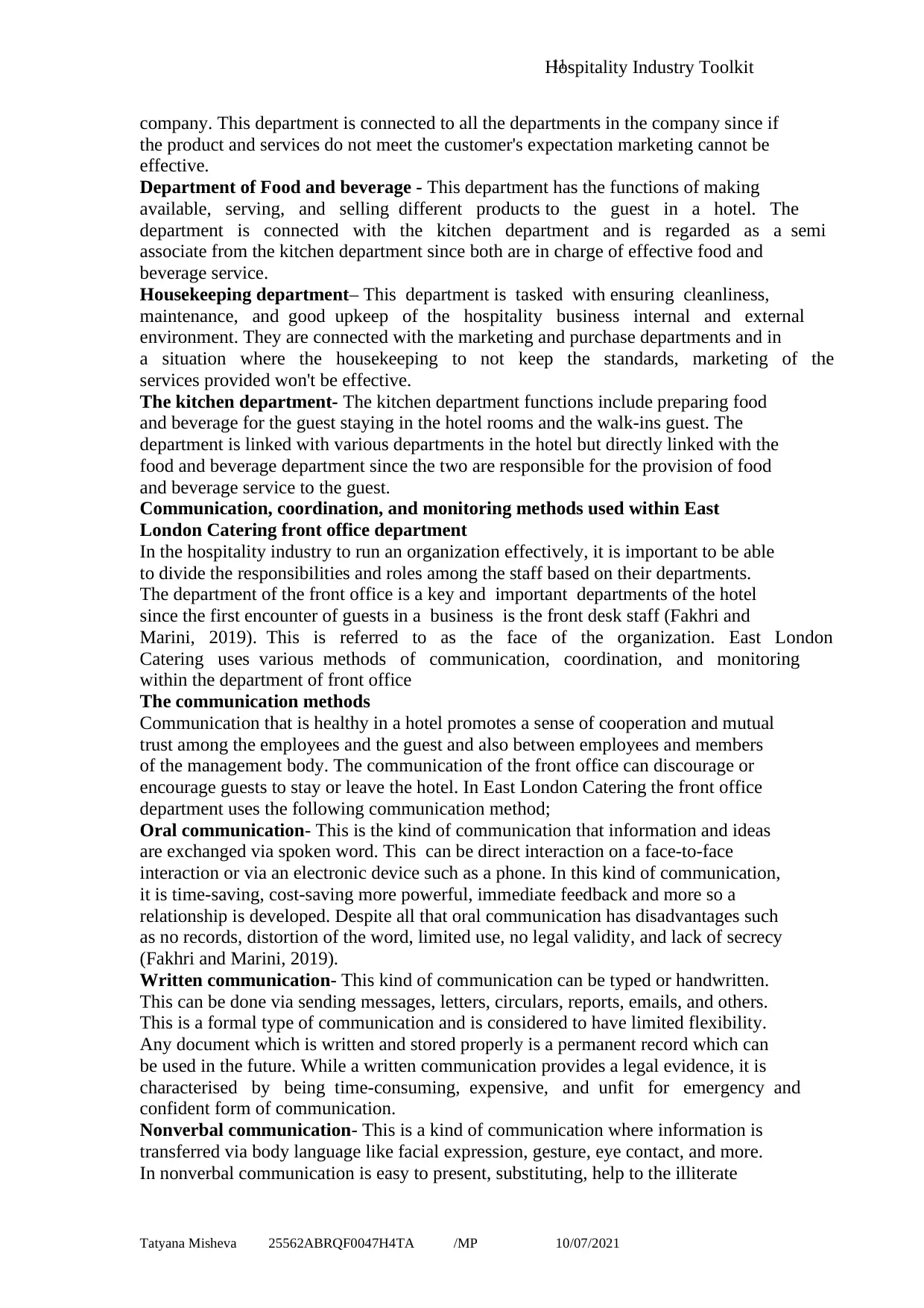
Hospitality Industry Toolkit
company. This department is connected to all the departments in the company since if
the product and services do not meet the customer's expectation marketing cannot be
effective.
Department of Food and beverage - This department has the functions of making
available, serving, and selling different products to the guest in a hotel. The
department is connected with the kitchen department and is regarded as a semi
associate from the kitchen department since both are in charge of effective food and
beverage service.
Housekeeping department– This department is tasked with ensuring cleanliness,
maintenance, and good upkeep of the hospitality business internal and external
environment. They are connected with the marketing and purchase departments and in
a situation where the housekeeping to not keep the standards, marketing of the
services provided won't be effective.
The kitchen department- The kitchen department functions include preparing food
and beverage for the guest staying in the hotel rooms and the walk-ins guest. The
department is linked with various departments in the hotel but directly linked with the
food and beverage department since the two are responsible for the provision of food
and beverage service to the guest.
Communication, coordination, and monitoring methods used within East
London Catering front office department
In the hospitality industry to run an organization effectively, it is important to be able
to divide the responsibilities and roles among the staff based on their departments.
The department of the front office is a key and important departments of the hotel
since the first encounter of guests in a business is the front desk staff (Fakhri and
Marini, 2019). This is referred to as the face of the organization. East London
Catering uses various methods of communication, coordination, and monitoring
within the department of front office
The communication methods
Communication that is healthy in a hotel promotes a sense of cooperation and mutual
trust among the employees and the guest and also between employees and members
of the management body. The communication of the front office can discourage or
encourage guests to stay or leave the hotel. In East London Catering the front office
department uses the following communication method;
Oral communication- This is the kind of communication that information and ideas
are exchanged via spoken word. This can be direct interaction on a face-to-face
interaction or via an electronic device such as a phone. In this kind of communication,
it is time-saving, cost-saving more powerful, immediate feedback and more so a
relationship is developed. Despite all that oral communication has disadvantages such
as no records, distortion of the word, limited use, no legal validity, and lack of secrecy
(Fakhri and Marini, 2019).
Written communication- This kind of communication can be typed or handwritten.
This can be done via sending messages, letters, circulars, reports, emails, and others.
This is a formal type of communication and is considered to have limited flexibility.
Any document which is written and stored properly is a permanent record which can
be used in the future. While a written communication provides a legal evidence, it is
characterised by being time-consuming, expensive, and unfit for emergency and
confident form of communication.
Nonverbal communication- This is a kind of communication where information is
transferred via body language like facial expression, gesture, eye contact, and more.
In nonverbal communication is easy to present, substituting, help to the illiterate
Tatyana Misheva 25562ABRQF0047H4TA /MP 10/07/2021
11
company. This department is connected to all the departments in the company since if
the product and services do not meet the customer's expectation marketing cannot be
effective.
Department of Food and beverage - This department has the functions of making
available, serving, and selling different products to the guest in a hotel. The
department is connected with the kitchen department and is regarded as a semi
associate from the kitchen department since both are in charge of effective food and
beverage service.
Housekeeping department– This department is tasked with ensuring cleanliness,
maintenance, and good upkeep of the hospitality business internal and external
environment. They are connected with the marketing and purchase departments and in
a situation where the housekeeping to not keep the standards, marketing of the
services provided won't be effective.
The kitchen department- The kitchen department functions include preparing food
and beverage for the guest staying in the hotel rooms and the walk-ins guest. The
department is linked with various departments in the hotel but directly linked with the
food and beverage department since the two are responsible for the provision of food
and beverage service to the guest.
Communication, coordination, and monitoring methods used within East
London Catering front office department
In the hospitality industry to run an organization effectively, it is important to be able
to divide the responsibilities and roles among the staff based on their departments.
The department of the front office is a key and important departments of the hotel
since the first encounter of guests in a business is the front desk staff (Fakhri and
Marini, 2019). This is referred to as the face of the organization. East London
Catering uses various methods of communication, coordination, and monitoring
within the department of front office
The communication methods
Communication that is healthy in a hotel promotes a sense of cooperation and mutual
trust among the employees and the guest and also between employees and members
of the management body. The communication of the front office can discourage or
encourage guests to stay or leave the hotel. In East London Catering the front office
department uses the following communication method;
Oral communication- This is the kind of communication that information and ideas
are exchanged via spoken word. This can be direct interaction on a face-to-face
interaction or via an electronic device such as a phone. In this kind of communication,
it is time-saving, cost-saving more powerful, immediate feedback and more so a
relationship is developed. Despite all that oral communication has disadvantages such
as no records, distortion of the word, limited use, no legal validity, and lack of secrecy
(Fakhri and Marini, 2019).
Written communication- This kind of communication can be typed or handwritten.
This can be done via sending messages, letters, circulars, reports, emails, and others.
This is a formal type of communication and is considered to have limited flexibility.
Any document which is written and stored properly is a permanent record which can
be used in the future. While a written communication provides a legal evidence, it is
characterised by being time-consuming, expensive, and unfit for emergency and
confident form of communication.
Nonverbal communication- This is a kind of communication where information is
transferred via body language like facial expression, gesture, eye contact, and more.
In nonverbal communication is easy to present, substituting, help to the illiterate
Tatyana Misheva 25562ABRQF0047H4TA /MP 10/07/2021
11
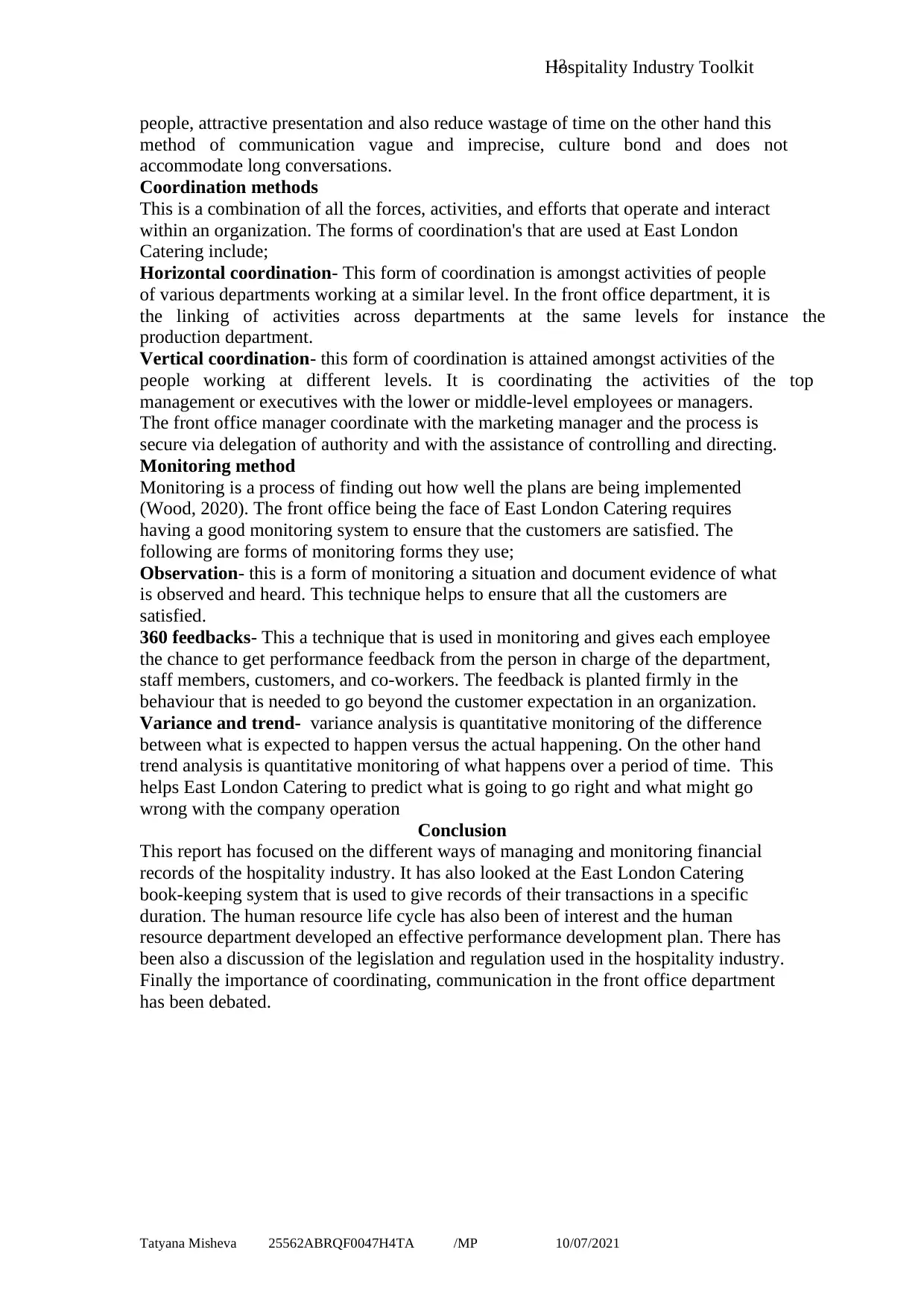
Hospitality Industry Toolkit
people, attractive presentation and also reduce wastage of time on the other hand this
method of communication vague and imprecise, culture bond and does not
accommodate long conversations.
Coordination methods
This is a combination of all the forces, activities, and efforts that operate and interact
within an organization. The forms of coordination's that are used at East London
Catering include;
Horizontal coordination- This form of coordination is amongst activities of people
of various departments working at a similar level. In the front office department, it is
the linking of activities across departments at the same levels for instance the
production department.
Vertical coordination- this form of coordination is attained amongst activities of the
people working at different levels. It is coordinating the activities of the top
management or executives with the lower or middle-level employees or managers.
The front office manager coordinate with the marketing manager and the process is
secure via delegation of authority and with the assistance of controlling and directing.
Monitoring method
Monitoring is a process of finding out how well the plans are being implemented
(Wood, 2020). The front office being the face of East London Catering requires
having a good monitoring system to ensure that the customers are satisfied. The
following are forms of monitoring forms they use;
Observation- this is a form of monitoring a situation and document evidence of what
is observed and heard. This technique helps to ensure that all the customers are
satisfied.
360 feedbacks- This a technique that is used in monitoring and gives each employee
the chance to get performance feedback from the person in charge of the department,
staff members, customers, and co-workers. The feedback is planted firmly in the
behaviour that is needed to go beyond the customer expectation in an organization.
Variance and trend- variance analysis is quantitative monitoring of the difference
between what is expected to happen versus the actual happening. On the other hand
trend analysis is quantitative monitoring of what happens over a period of time. This
helps East London Catering to predict what is going to go right and what might go
wrong with the company operation
Conclusion
This report has focused on the different ways of managing and monitoring financial
records of the hospitality industry. It has also looked at the East London Catering
book-keeping system that is used to give records of their transactions in a specific
duration. The human resource life cycle has also been of interest and the human
resource department developed an effective performance development plan. There has
been also a discussion of the legislation and regulation used in the hospitality industry.
Finally the importance of coordinating, communication in the front office department
has been debated.
Tatyana Misheva 25562ABRQF0047H4TA /MP 10/07/2021
12
people, attractive presentation and also reduce wastage of time on the other hand this
method of communication vague and imprecise, culture bond and does not
accommodate long conversations.
Coordination methods
This is a combination of all the forces, activities, and efforts that operate and interact
within an organization. The forms of coordination's that are used at East London
Catering include;
Horizontal coordination- This form of coordination is amongst activities of people
of various departments working at a similar level. In the front office department, it is
the linking of activities across departments at the same levels for instance the
production department.
Vertical coordination- this form of coordination is attained amongst activities of the
people working at different levels. It is coordinating the activities of the top
management or executives with the lower or middle-level employees or managers.
The front office manager coordinate with the marketing manager and the process is
secure via delegation of authority and with the assistance of controlling and directing.
Monitoring method
Monitoring is a process of finding out how well the plans are being implemented
(Wood, 2020). The front office being the face of East London Catering requires
having a good monitoring system to ensure that the customers are satisfied. The
following are forms of monitoring forms they use;
Observation- this is a form of monitoring a situation and document evidence of what
is observed and heard. This technique helps to ensure that all the customers are
satisfied.
360 feedbacks- This a technique that is used in monitoring and gives each employee
the chance to get performance feedback from the person in charge of the department,
staff members, customers, and co-workers. The feedback is planted firmly in the
behaviour that is needed to go beyond the customer expectation in an organization.
Variance and trend- variance analysis is quantitative monitoring of the difference
between what is expected to happen versus the actual happening. On the other hand
trend analysis is quantitative monitoring of what happens over a period of time. This
helps East London Catering to predict what is going to go right and what might go
wrong with the company operation
Conclusion
This report has focused on the different ways of managing and monitoring financial
records of the hospitality industry. It has also looked at the East London Catering
book-keeping system that is used to give records of their transactions in a specific
duration. The human resource life cycle has also been of interest and the human
resource department developed an effective performance development plan. There has
been also a discussion of the legislation and regulation used in the hospitality industry.
Finally the importance of coordinating, communication in the front office department
has been debated.
Tatyana Misheva 25562ABRQF0047H4TA /MP 10/07/2021
12
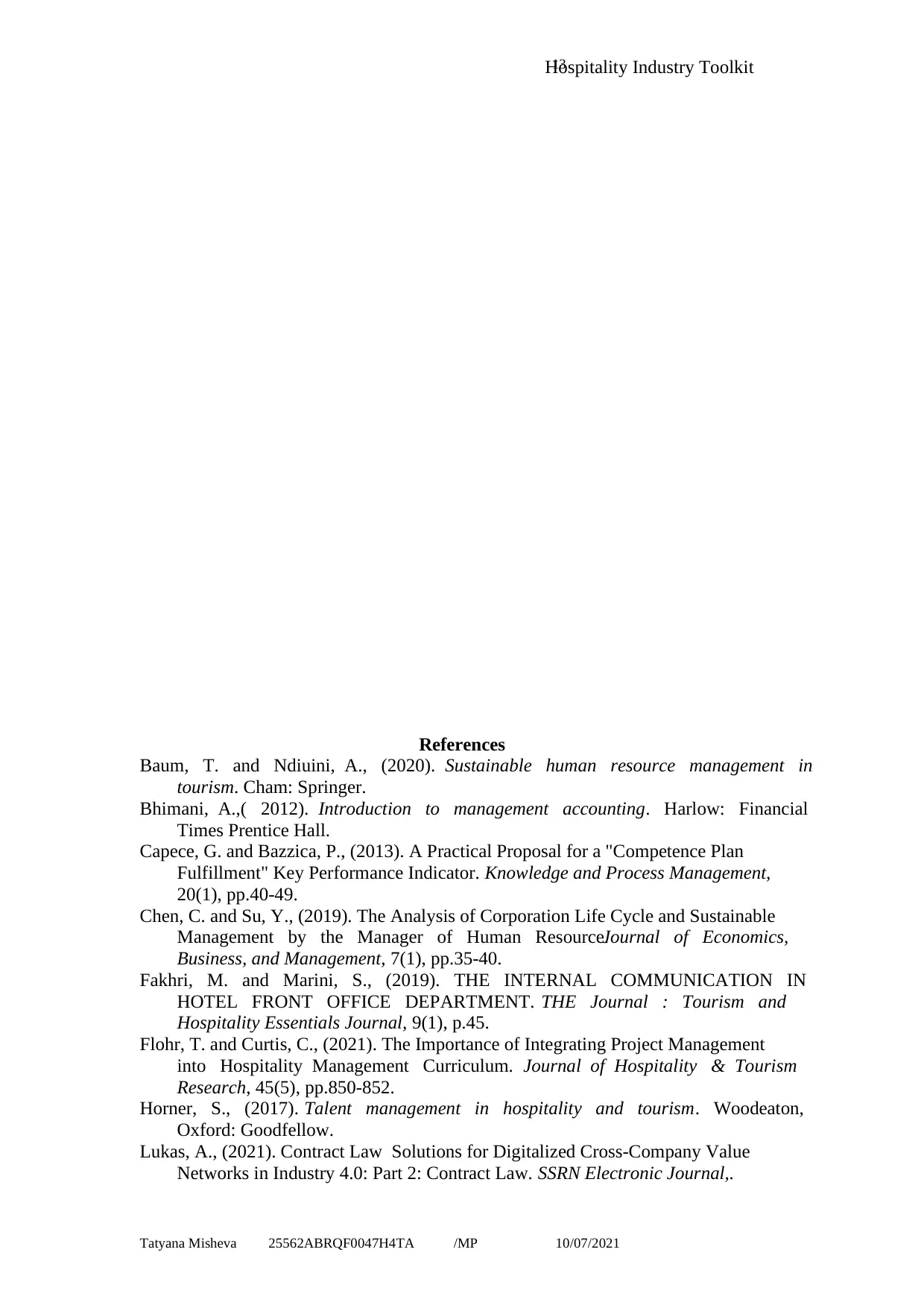
Hospitality Industry Toolkit
References
Baum, T. and Ndiuini, A., (2020). Sustainable human resource management in
tourism. Cham: Springer.
Bhimani, A.,( 2012). Introduction to management accounting. Harlow: Financial
Times Prentice Hall.
Capece, G. and Bazzica, P., (2013). A Practical Proposal for a "Competence Plan
Fulfillment" Key Performance Indicator. Knowledge and Process Management,
20(1), pp.40-49.
Chen, C. and Su, Y., (2019). The Analysis of Corporation Life Cycle and Sustainable
Management by the Manager of Human Resource.Journal of Economics,
Business, and Management, 7(1), pp.35-40.
Fakhri, M. and Marini, S., (2019). THE INTERNAL COMMUNICATION IN
HOTEL FRONT OFFICE DEPARTMENT. THE Journal : Tourism and
Hospitality Essentials Journal, 9(1), p.45.
Flohr, T. and Curtis, C., (2021). The Importance of Integrating Project Management
into Hospitality Management Curriculum. Journal of Hospitality & Tourism
Research, 45(5), pp.850-852.
Horner, S., (2017). Talent management in hospitality and tourism. Woodeaton,
Oxford: Goodfellow.
Lukas, A., (2021). Contract Law Solutions for Digitalized Cross-Company Value
Networks in Industry 4.0: Part 2: Contract Law. SSRN Electronic Journal,.
Tatyana Misheva 25562ABRQF0047H4TA /MP 10/07/2021
13
References
Baum, T. and Ndiuini, A., (2020). Sustainable human resource management in
tourism. Cham: Springer.
Bhimani, A.,( 2012). Introduction to management accounting. Harlow: Financial
Times Prentice Hall.
Capece, G. and Bazzica, P., (2013). A Practical Proposal for a "Competence Plan
Fulfillment" Key Performance Indicator. Knowledge and Process Management,
20(1), pp.40-49.
Chen, C. and Su, Y., (2019). The Analysis of Corporation Life Cycle and Sustainable
Management by the Manager of Human Resource.Journal of Economics,
Business, and Management, 7(1), pp.35-40.
Fakhri, M. and Marini, S., (2019). THE INTERNAL COMMUNICATION IN
HOTEL FRONT OFFICE DEPARTMENT. THE Journal : Tourism and
Hospitality Essentials Journal, 9(1), p.45.
Flohr, T. and Curtis, C., (2021). The Importance of Integrating Project Management
into Hospitality Management Curriculum. Journal of Hospitality & Tourism
Research, 45(5), pp.850-852.
Horner, S., (2017). Talent management in hospitality and tourism. Woodeaton,
Oxford: Goodfellow.
Lukas, A., (2021). Contract Law Solutions for Digitalized Cross-Company Value
Networks in Industry 4.0: Part 2: Contract Law. SSRN Electronic Journal,.
Tatyana Misheva 25562ABRQF0047H4TA /MP 10/07/2021
13
Paraphrase This Document
Need a fresh take? Get an instant paraphrase of this document with our AI Paraphraser
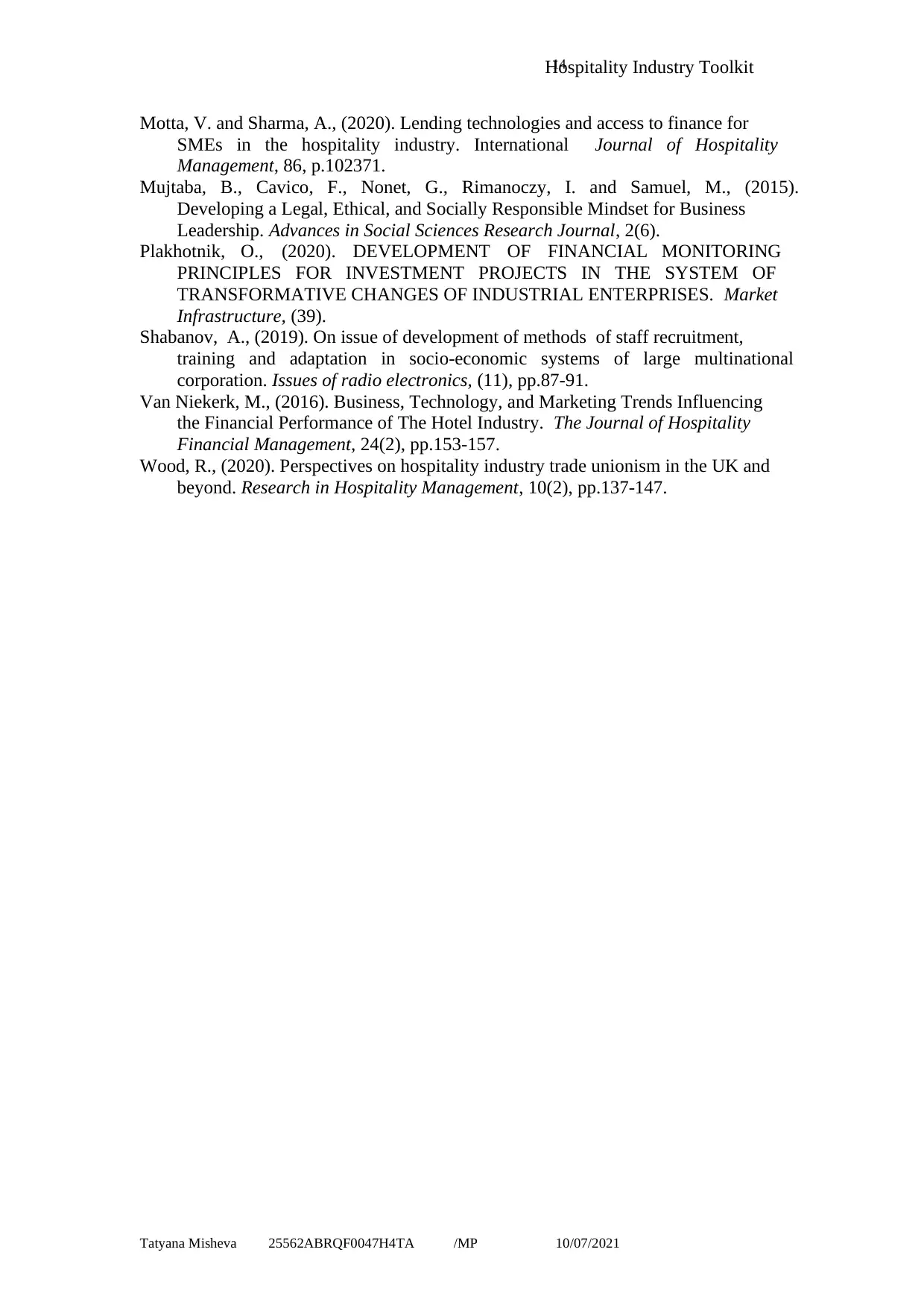
Hospitality Industry Toolkit
Motta, V. and Sharma, A., (2020). Lending technologies and access to finance for
SMEs in the hospitality industry. International Journal of Hospitality
Management, 86, p.102371.
Mujtaba, B., Cavico, F., Nonet, G., Rimanoczy, I. and Samuel, M., (2015).
Developing a Legal, Ethical, and Socially Responsible Mindset for Business
Leadership. Advances in Social Sciences Research Journal, 2(6).
Plakhotnik, O., (2020). DEVELOPMENT OF FINANCIAL MONITORING
PRINCIPLES FOR INVESTMENT PROJECTS IN THE SYSTEM OF
TRANSFORMATIVE CHANGES OF INDUSTRIAL ENTERPRISES. Market
Infrastructure, (39).
Shabanov, A., (2019). On issue of development of methods of staff recruitment,
training and adaptation in socio-economic systems of large multinational
corporation. Issues of radio electronics, (11), pp.87-91.
Van Niekerk, M., (2016). Business, Technology, and Marketing Trends Influencing
the Financial Performance of The Hotel Industry. The Journal of Hospitality
Financial Management, 24(2), pp.153-157.
Wood, R., (2020). Perspectives on hospitality industry trade unionism in the UK and
beyond. Research in Hospitality Management, 10(2), pp.137-147.
Tatyana Misheva 25562ABRQF0047H4TA /MP 10/07/2021
14
Motta, V. and Sharma, A., (2020). Lending technologies and access to finance for
SMEs in the hospitality industry. International Journal of Hospitality
Management, 86, p.102371.
Mujtaba, B., Cavico, F., Nonet, G., Rimanoczy, I. and Samuel, M., (2015).
Developing a Legal, Ethical, and Socially Responsible Mindset for Business
Leadership. Advances in Social Sciences Research Journal, 2(6).
Plakhotnik, O., (2020). DEVELOPMENT OF FINANCIAL MONITORING
PRINCIPLES FOR INVESTMENT PROJECTS IN THE SYSTEM OF
TRANSFORMATIVE CHANGES OF INDUSTRIAL ENTERPRISES. Market
Infrastructure, (39).
Shabanov, A., (2019). On issue of development of methods of staff recruitment,
training and adaptation in socio-economic systems of large multinational
corporation. Issues of radio electronics, (11), pp.87-91.
Van Niekerk, M., (2016). Business, Technology, and Marketing Trends Influencing
the Financial Performance of The Hotel Industry. The Journal of Hospitality
Financial Management, 24(2), pp.153-157.
Wood, R., (2020). Perspectives on hospitality industry trade unionism in the UK and
beyond. Research in Hospitality Management, 10(2), pp.137-147.
Tatyana Misheva 25562ABRQF0047H4TA /MP 10/07/2021
14
1 out of 14
Related Documents
Your All-in-One AI-Powered Toolkit for Academic Success.
+13062052269
info@desklib.com
Available 24*7 on WhatsApp / Email
![[object Object]](/_next/static/media/star-bottom.7253800d.svg)
Unlock your academic potential
© 2024 | Zucol Services PVT LTD | All rights reserved.




